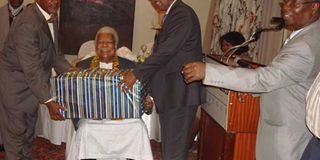I’ve lost a friend with a big heart, oasis of golden letters

Former JKUAT Chancellor, the late Prof Ali Mazrui. Mombasa is preparing to say its final farewell to Prof Ali Mazrui, one of its greatest sons, who died in the United States this week aged 81. PHOTO | FILE
What you need to know:
- In 1974, I had the pleasure of receiving him at the Heinemann Educational Publishers offices at the International House, Nairobi, when he paid us a visit on arrival from Kampala, Uganda.
- I later had the privilege of publishing him and, therefore, personally interacting with him at the East African Educational Publishers (EAEP) — the company I set up after acquiring Heinemann in the early 1990s.
- It’s unfortunate that I did not get the chance to publish The Africans: A Triple Heritage, which is perhaps Prof Mazrui’s magnum opus, and which firmly placed his global intellectual stature at a higher pedestal.
The death of Prof Ali Mazrui has not only snatched away an invaluable author, but also made me lose a friend I first met way back in 1974.
It’s rather interesting, almost bizarre, the way death creates fresh and fond memories of days gone by, making one to nostalgically reminisce about the happy times one shared with the deceased. This is the state I found myself in, on receiving the sad news of Prof Mazrui’s demise.
In 1974, I had the pleasure of receiving him at the Heinemann Educational Publishers offices at the International House, Nairobi, when he paid us a visit on arrival from Kampala, Uganda.
Prof Mazrui was accompanied by his wife Molly, and two children.
Although I cannot clearly recollect the circumstances leading to his travel from Uganda, I can guess that it was the time he realized that he was exposing himself to serious danger lecturing at Makerere University during the murderous regime of Idi Amin Dada.
Since he was a close friend and guest of my Managing Director Bob Markham, we took good care of him and his family, including doing some shopping for them to ensure they were as comfortable as possible.
INTERESTING WORDPLAY
Mazrui later travelled to the US where he ended up teaching for many years until his death.
I later had the privilege of publishing him and, therefore, personally interacting with him at the East African Educational Publishers (EAEP) — the company I set up after acquiring Heinemann in the early 1990s.
We first worked on his volume, Swahili, State and Society: The Political Economy of an African Language, which he co-authored with his nephew and linguistics scholar, Prof Alamin Mazrui.
After that we published his most referenced work to-date, Nationalism and New States in Africa: From 1935 to the Present, co-authored with Michael Tidy.
Others were General History of Africa Vol. VIII: Africa Since 1935; and the famous Reith Lectures published in the volume, The African Condition: A Political Diagnosis.
I need to mention that before these works, at Heinemann we had already published his The Trial of Christopher Okigbo under the African Writers Series, a work that drew sharp criticism from literary enthusiasts.
It’s unfortunate that I did not get the chance to publish The Africans: A Triple Heritage, which is perhaps Prof Mazrui’s magnum opus, and which firmly placed his global intellectual stature at a higher pedestal.
Publishing Prof Mazrui was both intellectually fulfilling and stimulating. He had the rare gift of engaging in a lot of interesting wordplay in speech and in his writing, which made his work to read rather well. He loved engaging in debates and discussions, and would draw examples from a wide range of subjects to support his arguments.
Combine this with his gripping stature, which made him inspire many people, young and old alike, and actually become a mentor to many. At times as he spoke passionately and eloquently on a subject, his audience would be spellbound, as if he was a form of a deity. Yet he was also humble and would not shy away from interacting and chatting with people of all walks of life, sometimes even inviting some to his hotel room for a chat.
I must also say that professor was a generous man — not just in sharing his knowledge — but also his resources. I recall that in the 1980s we had a telephone conversation during which he informed me that he would be presenting a paper at the African Studies Association (ASA) seminar in the US.
VINTAGE MAZRUI
I indicated that I would love to listen to him, and he immediately offered me a return ticket and promised to take care of my upkeep during my stay there.
Unfortunately I was unable to take up the offer due to other engagements, but he assured me that the offer was still open any time I was ready to travel.
His life was a kind of an open book, so to speak. He annually released a newsletter through which he shared his accomplishments in the past year, as well as key developments at a personal and family level.
He would then circulate the newsletter to as wide an audience as possible. With this kind of information, I have no doubt his biographer will have more than enough resources to put together a credible work on the life and times of Prof Mazrui.
I look forward to publishing such a work.
That was vintage Prof Mazrui — a lover of knowledge; an eloquent debater; a mentor to many; and also a connoisseur of top-class restaurants and good food.
Although he is gone, we are lucky that he has left us with enormous knowledge in the form of the books we published at EAEP; and we are therefore glad that future generations will continue to benefit from his wide knowledge and wisdom. Rest in peace, my good author and friend.
Henry Chakava is the Chairman of East African Educational Publishers, and a longtime friend and publisher of Prof Ali Mazrui




